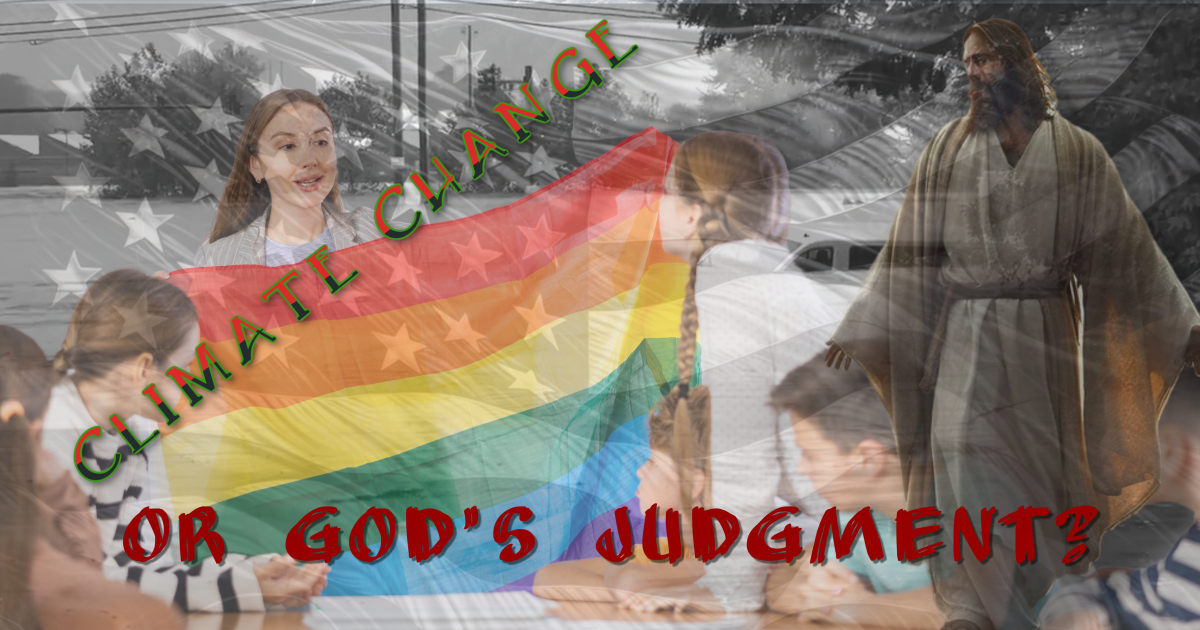Climate Change..or Judgement of GOD?
The bible belt of the U.S. has long been forgotten by most americans when it dominated the conservative movement in the 60’s and 70’s. America was awaking into more of a liberal view, and by the late 70’s with Roe VS Wade, feminism, sexual revolution, along with an ever changing scene with music and culture, the bible belt began to see it’s decline.
Colleges and Universities along with High Schools began to teach a more Darwin Theory approach to creation, and young people began to call religion superstitious and fables. Churches held their own as congregations began to age and the next generation of leaders would be raised up.
Fast track to 2024, and all across the world religion has taken a back seat. Many have turned from their roots and now dont have any resemblance of a religious belief. Europe has experienced a unprecedented decline in Church attendance, and so has America. Churches who have members consistently, are in bed with the world, share wordily views, and have their own set of sexual immorality issues among perishners, clergy, and pastors. Much like the Apostle Paul wrote about with the Churches he started, nothing is any different today..just more churches and more instances because of it.
Is there something else taking place here that would indicate more of a biblical reason why Asheville, and surrounding areas were hit with such ferocity and devastation?
We only need to look to scripture to answer that question.
Why and how does GOD judge?
- Judgment in the future: The Bible warns that God will judge nations in the future, including gathering all nations before Christ and separating them like a shepherd separates sheep from goats.
- Judgment in the present: God judges nations and individuals who defy Him and commit evil, even now.
- Judgment as correction: God’s judgment is not for punishment, but for correction. He judges to bring people back to Him when they go astray.
- Judgment for repentance: God’s judgment is intended to cause people to return to Him and call out in repentance.
- Judgment for sins: The Old Testament warns that God will judge the sins of Israel and Judah with national disasters, such as failed harvests and losses on the battlefield.
- Judgment for actions of a king: God judged Israel and its king when it turned against God.
When God Wants To Judge A Nation, He Gives Them Wicked Rulers.
John Calvin wrote: “When God wants to judge a nation, He gives them wicked rulers”. The Bible also says in Jeremiah 23:19 “See, the storm of the LORD will burst out in wrath, a whirlwind swirling down on the heads of the wicked.”
Maybe the place to begin is with a premise: if we believe the Christian teaching that God is just, all-wise, and the creator of all things, then it is His prerogative to judge human beings. The bracing claim that Christianity brings to us is that we are all sinners, that none of us have lived a life that merits escaping judgment. No one can say that God’s judgment is unwarranted on the grounds that he or she has lived a life of moral perfection. Accepting the twin ideas of a holy God and sinful humanity immediately leads to God’s right to judge sin. At a gut level, in fact, we want a God who judges sin. We do not want a God who is uncaring when humans are trafficked for sex slavery, nor do we want a God who does not care when children are abused. Our souls cry out for justice, as did the biblical prophet Habakkuk. In the end, a God who cannot judge sin is either not all powerful or not all good.
Further, the Bible regularly shows that God can judge nations. If it is God’s right to judge every person, then it would certainly be his right to judge any group of people. The Old Testament is replete with warnings to Israel and Judah, God’s covenant people, that God will judge their sins with national disasters, particularly those of failed harvests and losses on the battlefield. Today’s individualist society struggles with this idea, as we realize that some of the citizens of Israel and Judah who lived through these devastating judgments were people who had remained faithful to God. The nation was never 100 percent apostate (1 Kings 19:18). The bible, though, is more corporate than those of us living in the West in the 21st century are — and when the whole nation suffered judgment, that judgment temporally fell on both the faithful and the apostate together. That strikes people with a modern sensibility as unfair, but it is the common biblical approach. One can almost open the books of the Old Testament prophets at random and find such a statement – from Micah, Isaiah, Jeremiah, and others — and while the reasons for those oracles of judgment are not always given, they often are, including nations that are guilty of injustice and idolatry.
The Old Testament also regularly testifies to God’s ability to judge other nations as well, not just his covenant people Israel and Judah. The short books of Nahum and Obadiah are concentrated entirely on the judgment that would fall upon Assyria and Edom, respectively. Ezekiel chapters 25-32 is composed of oracles of God’s prophets against foreign nations. One might object that those other nations are not God’s people, so He has no right or reason to judge them; however, if God made all peoples and all nations it remains His right to judge any of them. To be certain, He judges them by the light they do have, not by standards they have never known. But from a theological perspective all people, whether they know it or not, are in covenant with God through our descent from Adam to Noah. In that sense we are links in a covenantal chain.
In other words, it is God’s prerogative to judge any human being, and to argue otherwise means one is denying in a fundamental sense who God is. He has a right to judge us because he created us, because he is perfectly holy, and because we sin. God would be well within his right to judge any person at any time.
But the reason the Christian claim is bracing instead of deadening is because of what follows — the proclamation of God’s grace to sinners in Jesus Christ. Because God has that right does not mean He will always exercise that right. This is an important distinction, and a biblical one, too. The Bible testifies that God normally is holding back His judgment, restraining it, because He wishes to be merciful to sinners, not to smite us. 2 Peter 3 meditates on God’s judgment which has not yet occurred, even to the point of unbelievers mocking the Christian expectation of Jesus returning in judgment, and concludes, “But do not overlook this one fact, beloved, that with the Lord one day is as a thousand years, and a thousand years as one day. The Lord is not slow to fulfill his promise as some count slowness, but is patient toward you, not wishing that any should perish, but that all should reach repentance.” (2 Peter 3:8–9)
Nor is such a delay a merely New Testament phenomenon, a contrast to an “angry Old Testament God” who loved to smite nations. In fact, the grace of judgment delayed jumps off the pages of the Old Testament. God did bring judgment on the Canaanite practices of human sacrifice, but only after 400 years of delay (Gen. 15:13-16). God did judge Israel and Judah for stepping into those same practices of human sacrifice and for their continued idolatry and injustice, but only after hundreds of years of patience (1-2 Kings).[i] God may have the prerogative to judge sin at any time, but the story of the Old and New Testaments is really the remarkable story of how rarely He exercises that prerogative. Indeed, at some level the point of emotional struggle with the Old Testament should not be, “How could a loving God do that?” but instead “How could a loving God have waited so long to stop that?”
While God regularly restrains his judgment, the Bible also testifies to certain instances when He brought that judgment to bear in history, not waiting until the end of time. He did finally bring judgment on the Canaanite practices (cf. the book of Joshua) and upon Israel and Judah (cf. 1-2 Kings). He likewise brought judgment upon Egypt via the plagues and Israel’s exodus (cf. the book of Exodus). God who has the right to judge all people and will do so at the end of time also can choose to bring that judgment forward into history.
When a nation was conquered, the biblical prophets made the case that God was behind that event. They made the case generally, that God was in control of all human history, but they also occasionally made that case specifically (e.g.: Nahum and Obadiah, mentioned above), connecting specific behaviors and injustices to the national disasters that befell various nations and arguing that those disasters were God’s punishment on the respective nations. Likewise, the prophets made clear that the Assyrian and Babylonian attacks that destroyed Israel and Judah were his particular judgment on his people for their sinful behavior:
And this occurred because the people of Israel had sinned against the Lord their God, who had brought them up out of the land of Egypt from under the hand of Pharaoh king of Egypt, and had feared other gods and walked in the customs of the nations whom the Lord drove out before the people of Israel, and in the customs that the kings of Israel had practiced. (2 Kings 17:7-8)
In summary, the Bible teaches that it is God’s right to judge nations in real time; that He has done so in the past; and that He has done so not just in the case of Israel and Judah but also with other nations.
Does God Judge Nations Today?
Having established this, the question then become this: If God has the right to judge a nation-state and if He has done so in the past, will God do the same today? And if not, why not?
Initially, we must remember that there is not an exact parallel between modern nation-states and the nations in the Bible. Modern readers of the scriptures are sometimes tempted to make facile applications of the bible, forgetting the discontinuities between our situation and that of the biblical writers. “Nations” in the bible far more closely approximate what modern commentators would term “people groups.” The biblical nations were typically unified both ethnically and religiously in ways that most modern nations are not. Ancient empires such as Assyria and Babylonia are a closer analogy to modern nation-states, as they encompassed many different people groups, but even those empires were largely the outgrowth of one people group conquering many others and subjugating them.
The discontinuity matters; if we fail to recognize it, it could lead us into error. Nations, in the modern sense of the word, are a relatively new geopolitical development. The Bible really has no category corresponding to a modern democracy such as the United States, one that encompasses many different cultures and religions as a single nation. Nor does the Bible have a category approximating modern nations in a continent such as Africa, where colonialism resulted in national boundaries today that encompass many different tribal or ethnic groups. Nonetheless, if one allows that it is God’s right to judge any human being, then logically it follows that God could judge any group of human beings, and even if the groups today are of a different composition than the biblical nations, one would have to say that God could judge a modern nation-state should he wish to do so.
But “God could judge” is a much different statement than saying “God is judging” or “God should judge”! The Bible certainly teaches that God is in control of all things and working them out according to His plan (Rom. 8:18-30), but at the individual level, it also warns against making an explicit connection between a specific disaster and someone’s sin.
The book of Ecclesiastes meditates on the seeming capriciousness of life, how disasters can befall those who do well morally as well as those who do poorly. More to the point, Job’s friends accuse him of specific sins that caused the disasters that fell upon him, but the bible indicts them for such hubris. Job insists that he did nothing to cause the disasters, and at least in that statement he was correct. In Job 42:7 God declared to the leader of that trio, “My anger burns against you and against your two friends, for you have not spoken of me what is right, as my servant Job has.” Jesus takes the same perspective in John 9 with the man born blind. He explicitly denies his disciples’ request to make an individual connection between the man’s suffering and an individual sin:
As he passed by, he saw a man blind from birth. And his disciples asked him, “Rabbi, who sinned, this man or his parents, that he was born blind?” Jesus answered, “It was not that this man sinned, or his parents, but that the works of God might be displayed in him.” (John 9:1-3)
Similarly, in Luke 13:1-5 Jesus cautioned others against assuming that those who have experienced disaster were somehow more guilty than those who had escaped them. And, of course, one of the messages in the New Testament is that the righteous will not be rewarded on earth but persecuted.
The biblical directive seems very clear – do not connect a specific disaster with a specific sin. Yet, the prophets of the Old Testament did exactly that – they connected national disasters with specific sins. How could they do so, given what we have just seen?
One difference, of course, is that both Job 42 and John 9 deal with individuals, not nations. Yet, God’s right to judge described above is, in the end, because nations are groups of individuals; if He has the right to judge any individual, then He also implicitly has the right to judge a group of individuals that includes nation-states.
Instead, the ability to make the connection between specific acts and God’s purpose requires a specific prophetic inspiration from God. It requires being inspired as a true prophet of God, not a self-proclaimed one; of being able to interpret providence infallibly. We are not that. And note well: when individuals who are not actual prophets — whether Job’s three friends or Jesus’ own disciples — try to make the connection between suffering and God’s will, they often get it wrong.
We must be particularly careful to avoid making ourselves God’s inspired mouthpiece if we are not. Simply put, God never errs, but we do. The theological cause behind the event and God’s intent of how to use that event in world history are part of His hidden will, not His prescriptive, revealed will. When we try to read the meaning behind events, we are trying to read God’s hand behind providence, and we must be very careful in doing so unless we have specific biblical warrant. When an event like a lethal pandemic occurs, it can be understood in at least two ways, either as God’s specific judgment or as more generally the suffering that happens in a fallen world. Unless we are to declare ourselves today to have the equivalent inspiration to that of an Old Testament prophet — if one even believes that precise gift continues at all — we ought to avoid such sweeping pronouncements. As Peter Wehner wrote recently in the New York Times:
Some high-profile Christians presume they can divine the messages God is sending the world through suffering, natural disasters and pandemics. But most Christians I know, and all of those with whom I was in touch, wisely stay away from attempting to answer the “Why?” question.[ii]
Our answer to why God allows tragedy and suffering to occur cannot be understood like a mathematical equation. It must be more measured, more qualified, more tentative, and more humble.
So, God could be judging a nation today, but he also might not be. We must be exceedingly careful about speaking for God, as he could be doing something entirely different than we think. As unsatisfying as it may be, since we would all love to discern cause and effect in the world, our answer must be a great, big “Maybe.” Because none of us are biblical prophets, we are instead seeing through a glass darkly.
An analogy may help us here. When visiting a patient in the hospital, occasionally someone will say “I think I’m suffering this sickness because God is judging me for my sin.” When many of us who are pastors hear that, with Job ringing in our ears, we have every inclination to respond, “No, He’s not.” And that answer may be true. But to jump right to that response may be to miss a pastoral opportunity. Instead, we might want to respond, “Well, before we get into that, is there some specific sin that you need to confess?” If so, let the person confess, and then, with sensitivity, say, “I have no idea if God is judging you specifically for that sin or not, but regardless, it will make you better and more whole and more liberated if you confess it.”
On the other hand, if the person in the hospital says, “No, there’s nothing specific. I just assume I must have sinned if I received this awful diagnosis,” then we should correct that person’s theology and put him or her at rest. All sickness comes from sin in a general sense, but not in the specific sense this individual fears. Evil happenings are a general reminder that we need to repent from sin and there is brokenness in this world because of sin. But the New Testament reminds us it is usually not a specific, discernable, one-to-one relationship.
The Disturbing Assumption
Most important theologically, though, we need to challenge the underlying assumption behind the interpretation. Too often the common thinking is, “God judged Israel, so now he is judging America.”
The implicit logic in that thinking is “America = the New Israel.” Here we must be theologically clear: No. America is closer to biblical Babylon than it is to biblical Israel. Certainly, the United States, as every other nation-state, may have had times where its overall culture has been more or less godly, but all the nations of the earth are still at some level what John Bunyan called Vanity Fair.
In the New Testament the church of Christ, born long before the United States of America existed, is the institution that parallels the nation of Israel in the Old Testament. The New Testament regularly applies to the church the titles given to Israel in the Old Testament. Galatians 6:16 calls the church “the Israel of God.” 1 Peter 2:9 says to the church, “But you are a chosen race, a royal priesthood, a holy nation, a people for his own possession, that you may proclaim the excellencies of him who called you out of darkness into his marvelous light.” Philippians 3:3 calls the church “the circumcision”; Ephesians 1:4 calls the church “the chosen.” And there are more verses I could cite.
Under the influence of both dispensational thinking and the appropriate historical recoil from the evil of anti-Semitism, some modern Christians have backed away from this teaching, labeling it supersessionism or “replacement theology” to dismiss it. But we must understand that this has been the teaching of the Christian church for most all of its existence.[iii] (As one example, consider Hebrews chapters 1-10.)
Rather, we should consider the church not as the replacement for Israel but as the expansion of Israel to include Gentiles. True Israel, the portion of the nation that truly followed God, has always existed, even when much of the nation was apostate (see 1 Kings 19:18). And when that true Israel received her king in Jesus Christ, she expanded to include a flood of Gentiles who also bowed the knee to that king as their lord and savior, and that expanded true Israel is called “the church.” Ephesians 2:12-13 says to those Gentile converts:
Remember that you were at that time separated from Christ, alienated from the commonwealth of Israel and strangers to the covenants of promise, having no hope and without God in the world. But now in Christ Jesus you who once were far off have been brought near by the blood of Christ.
The Old Testament limitation of the Kingdom of God to one nation has been broadened to include people of every tribe and tongue (Rev. 7:9), such that they are all sons of Abraham (Gal. 3:29).
If any group should be asking, “Is God judging us?” then, it should be the church, not a nation, and not America. As the direct heir of Old Testament Israel and the New Testament analog to the Old Testament people of God, the church should not be asking, “What’s wrong with America these days that God is judging it?” If we even want to consider the question, then we should at least ask it the right way: “What sins is the church guilty of committing?”
Those Old Testament prophets who announced God’s judgment on his people Israel had a few categories of sin that were particular concerns: idolatry and injustice paramount among them, with that injustice expressed by a lack of care for what has often been termed “the unlucky trio of the Old Testament,” the refugee, the widow, and the orphan.
When Old Testament Israel and Judah were conquered, both true believers and apostates suffered the consequences. What that meant was that anyone suffering could plausibly think, “Well, I’m fine. We’re suffering because of those other people. I just unfortunately got caught up in the bigger problem.” But to that, Jesus says (Matt. 7:5) “Take the log out of your own eye.”
In other words, if we want to ask the question at all, we should stop asking how the rest of our country sinned and start asking, “How have we the church sinned?” Asking that question tends to be more pleasing to God, better for us, and better for the world.
End Notes
Scripture quotations are from The ESV® Bible (The Holy Bible, English Standard Version®), copyright © 2001 by Crossway, a publishing ministry of Good News Publishers. Used by permission. All rights reserved.
[i] We should add that this observation pushes back against the idea that God is on the side of one racial group. When Israel and Judah adopted Canaanite practices like child sacrifice, God treated them in the same way he had the Canaanites. The issue is not “God versus this racial group” but “God versus sin.”
[ii] https://www.nytimes.com/2020/04/10/opinion/sunday/covid-easter-christians.html
[iii] We absolutely reject any anti-Semitism. To say that Judaism and Christianity diverged from one into two separate religions is simply to acknowledge an empirical fact. Christians would say this, and so would Jews. And if pluralism means anything, it must be possible to be part of a different religion yet still treat someone with grace and goodness. Otherwise we ought to simply call off the whole Western experiment and return to (literally) the culture wars.












